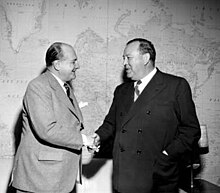Carlos Echeverri Cortés
Carlos Echeverri Cortés | |
|---|---|
 Dr. Carlos Echeverri Cortes (left) with U.N. Secretary-General Trygve Lie (right), at U.N. Headquarters. | |
| 5th Permanent Representative of Colombia to the United Nations | |
| In office August 1952 – 5 March 1953 | |
| President | Roberto Urdaneta Arbeláez |
| Preceded by | Elíseo Arango Ramos |
| Succeeded by | Evaristo Sourdis Juliao |
| 27th Colombian Minister of Posts and Telegraphs | |
| In office 29 August 1951 – 29 April 1952 | |
| President | Laureano Gómez Castro Roberto Urdaneta Arbeláez |
| Preceded by | José Tomás Angulo |
| Succeeded by | Carlos Albornoz |
| 6th Colombian Ambassador to Peru | |
| In office 16 July 1947 – 16 November 1949 | |
| President | Mariano Ospina Pérez |
| Succeeded by | Eduardo Zuleta Ángel |
| Colombian Ambassador to Mexico | |
| In office 1945 – 16 July 1947 | |
| Preceded by | Jorge Zalamea Borda |
| Succeeded by | Carlos Arango Vélez |
| Personal details | |
| Born | 23 June 1900 Bogotá, D.C., Colombia |
| Died | 14 March 1974 (aged 73) Bogotá, D.C., Colombia |
| Political party | Conservative |
| Spouse | Gloria Rodríguez García |
| Alma mater | University of London |
| Profession | Economist |
Carlos Echeverri Cortés (23 June 1900 – 14 March 1974)[1][2] was a Colombian economist and diplomat who served as ad interim fifth Permanent Representative of Colombia to the United Nations, and as Ambassador of Colombia to Peru and Mexico.[3][4] During his ambassadorship in Peru he became an enemy of the administration of President Manuel Arturo Odría Amoretti for granting political asylum to the politician Víctor Raúl Haya de la Torre, an action that drove the Peruvian Government to mount a five-year struggle harassing embassy staff and personnel, and forming a military blockade around the Colombian Embassy where Haya was housed, this because Lima had refused to grant safe conduct for Haya to leave the country and Ambassador Echeverri refused to give him up.[5]
Recognitions[edit]
- Order of the Aztec Eagle - Band (1949)[3]
See also[edit]
References[edit]
- ^ Restrepo Sáenz, José María; Restrepo Posada, José; Rivas, Raimundo (2000) [1991]. Genealogías de Santa Fe de Bogotá, Volume 6 [Genealogies of Santa Fe de Bogotá, Volume 6] (in Spanish). Bogotá: Editorial Presencia. OCLC 28546996.
- ^ "Obituaries". Revista Javeriana (Magazine) (in Spanish). 81 (401–405). Bogotá: Imprenta del C. de Jesús: 325. 1974. ISSN 0120-3088. OCLC 1763965. Retrieved 2010-12-24.
- ^ a b Memoria de Relaciones Exteriores [Memoirs of Foreign Affairs]. National Printing Office of Colombia. 1949. pp. 91–92. Retrieved 2010-12-23.
- ^ Tirado Mejía, Alvaro; Londoño Paredes, Julio; Pardo García-Peña, Rodrigo (September 1995). "Colombia en las Naciones Unidas, 50 años de historia y participación" [Colombia in the United Nations, 50 years of history and participation]. Revista Credencial Historia (in Spanish) (69). Bogotá: Luís Ángel Arango Library. ISSN 0121-3296. Archived from the original on 2008-12-01. Retrieved 2010-12-23.
- ^ Haya de la Torre, Víctor Raúl (1954-05-03). "My Five Year Exile In My Own Country". Life. 36 (18). Time Inc: 152–167. ISSN 0024-3019. Retrieved 2010-12-24.
